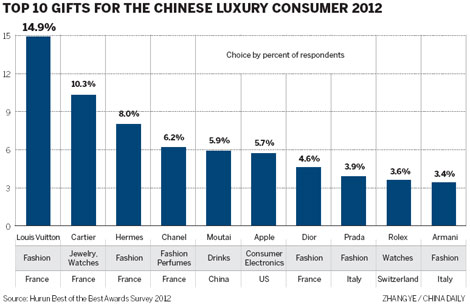Domestic brands largely absent from gift lists
Updated: 2012-01-12 10:00
By Wang Zhuoqiong and Yu Ran (China Daily)
|
|||||||||||
BEIJING / SHANGHAI - Louis Vuitton, Cartier and Hermes are the most popular luxury labels that wealthy Chinese reach for when giving gifts to friends and business contacts, with the Chinese liquor Moutai the only domestic brand among the top 10, a study of the nation's richest people has found.
"Gift-giving is an essential part of Chinese culture," Rupert Hoogewerf, chairman and chief researcher of the Hurun Report, a research unit and publishing group, told a news conference in Beijing on Wednesday.
"The money spent on gifts is staggering compared with the West."
The report, Top 10 Gifts for the Chinese Luxury Consumer 2012, found that French brands dominate with the five of the top 10, followed by Italy's Gucci and Prada. Apple Inc of the US was sixth.
The study covered 503 wealthy Chinese on the mainland as it sought to reveal their brand awareness and preferences, consumption habits and lifestyle trends.
Those interviewed - mostly engaged in manufacturing and property development - had average wealth of 63 million yuan ($10 million), up 15 percent from the previous year.
Their spending for the year, however, fell 9 percent to 1.76 million yuan, or about 3 percent of each one's wealth.
China's richest consumers spent the most on travel, followed by education for their children, entertainment, gifts and collecting, the report said.
Guan Hongsheng, 44, who owns a trading company in Wenzhou, Zhejiang province, spent more than 1 million yuan last year on giving gifts to business contacts.
The gifts included more than 40 iPhones, seven iPad 2s, a dozen Macbooks and items from Cartier, Hermes and Montblanc.
"What I want is a brand that is widely recognized," Guan said. "Domestic brands are still not well-known enough for my friends. I prefer the latest items that cost more than 10,000 yuan each."
Quality and "history" are also highly important when the Chinese super-rich choose brands.
"Luxury brands make it easier for the recipient to understand the value of the present," said Chen Lijun, a 63-year-old billionaire and the owner of Zhejiang Huari Industry Investment Co Ltd.
Chen gave watches, jewelry and wallets worth nearly 2 million yuan last year as gifts.
China is home to more than 1 million super-luxury consumers based on a study by the Hurun Report in April last year, which identified 960,000 individuals with personal wealth of 10 million yuan.
Hurun's wealthy individuals are 41 years old, on average.
A typical wealthy Chinese individual included in the survey "has two private bank accounts, 4.2 watches and three cars," Hoogewerf said.
"They travel eight days a month for work. They go abroad three times and spend 20 days for leisure in a year."
The report found that the very wealthy have less interest in real estate this year, which still tops their investment category, with gold ranked second and fixed-income securities ranked third.

Related Stories
Luxury brands focus on China 2005-05-19 19:26
Wealthy Chinese falling in love with luxury 2011-04-19 10:58
Everybody wants luxury, but not at any price 2010-07-29 09:26
China to raise luxury taxes further 2006-11-15 14:21
- France's Renault eyes to enter in China
- Huaneng moves ahead on Shandong nuclear plant
- Dec inflation dips to 4.1%, 2011 CPI at 5.4%
- Yuan cross-border channels expand
- Experts call for deposit insurance
- China says energy consumption is controllable
- Oil leak risk rises along coast
- Company blacklist for quality problems








